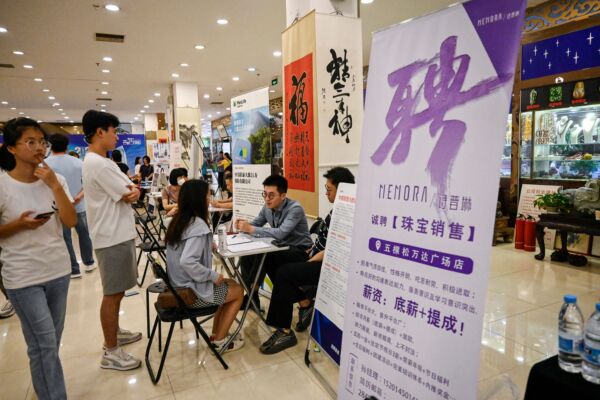As China’s economy continues to worsen, young people are finding it increasingly difficult to secure jobs, resulting in a common phenomenon of unemployment upon graduation. Online discussions have highlighted terms like “county Brahmins” and “city slickers”, along with previous discussions on the concept of “guanxi” and privilege, sparking heated debates. Analysts believe that under Xi Jinping’s rule emphasizing power through familial connections and lifetime appointments, the CCP’s nepotism has escalated, making it challenging for talented individuals from ordinary backgrounds to progress socially.
In the context of mainland China, “Brahmins” refer to the highest caste in Indian society, holding significant social status. In the Chinese context, “county Brahmins” are individuals in county or small cities who occupy a privileged social status based on their family connections.
Frequent instances can be found on Chinese social media platforms where university graduates, postgraduates, and even doctoral students struggle to find ideal jobs in big cities after graduation. Some are forced to return to their hometowns to work as “new farmers”, while others with high academic qualifications continue to toil in big cities, leading a life of struggle where they can’t afford houses, high consumption, or even marriage.
They suddenly realize that classmates with lesser academic achievements who stayed in their hometowns or small cities are able to secure excellent jobs through their parents’ connections, living a lifestyle akin to nobility.
Historian Li Yuanhua based in Australia tells Dajiyuan that in today’s Chinese society, the path that many aspire to—to change their social status and alter the fate of their families through hard work and education—has essentially been blocked. The notion of “knowledge changing destiny” is no longer valid.
Moreover, the value of education has depreciated. Li Yuanhua notes that even with high academic qualifications, individuals struggle to secure good jobs, creating a perplexing situation where those at the bottom of society feel lost.
Regarding the concept of “county Brahmins”, Li Yuanhua explains that within the bureaucratic system at the county level, individuals all know each other and play favors reciprocally. This results in smooth sailing for those with familial ties within this echelon of society. This phenomenon illustrates a concrete manifestation of the CCP’s bureaucratic practices, where individuals with family connections overshadow those with academic merits.
President of the American real estate and investment firm F. Max Property, Jiang Pinchao, speaking to Dajiyuan, criticizes Xi Jinping for intensifying nepotism within the CCP’s bureaucratic system through the concentration of power and lack of successor designation.
Jiang Pinchao points out that Xi Jinping engages in power exchanges and successions within familial connections, with his “secretarial team” within the CCP Central Committee’s Politburo Standing Committee essentially acting as his inner circle.
He emphasizes that this exclusive network makes it challenging for individuals, regardless of their abilities, to penetrate Xi’s inner circle, leading to a top-down continuity of such practices prevalent not just in politics, but across various sectors of Chinese society, including the economy, commerce, culture, and arts.
Jiang Pinchao believes that while “county Brahmins” are prevalent in small cities, this nepotistic system essentially extends from the top downwards within the CCP. Over time, this hierarchy propagates, making upward social mobility difficult for ordinary citizens across various levels of the society.
Li Yuanhua notes that historically in China, there was a pathway for individuals from humble backgrounds to rise through diligent study into the upper echelon of society. However, if opportunities at the county level are blocked, then there is minimal chance for lower-tier individuals to ascend, resulting in a solidification of the CCP’s social hierarchy.
Jiang Pinchao opines that China lacks a mechanism for introducing new blood across societal strata. Established beneficiaries continue to hold onto positions, denying the younger talents, despite their academic and professional capabilities, the chance to advance.
The term “pindie” signifies the issue at hand, where having influential connections ensures securing advantages within the entrenched benefits. Jiang Pinchao points out that this discourages individuals from striving academically, as relying on relationships seems sufficient, allowing the unskilled to thrive on family wealth, while skilled and hardworking individuals face barriers in utilizing their talents, leading to despair among the lower strata of society.
Jiang Pinchao asserts that this represents a serious societal challenge, underlining the importance of empowering new forces to enter the societal system. Failing to address this issue will give rise to further problems in the future.
He stresses that China’s biggest flaw lies in the absence of a proper system for the transition of power and assets. If this issue remains unresolved, it could lead to chaos.
Jiang Pinchao suggests that the problems surrounding uneven power succession and distribution in society will inevitably reach a breaking point. He believes that China stands on the brink of a new era of transformation.

